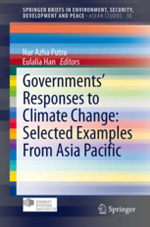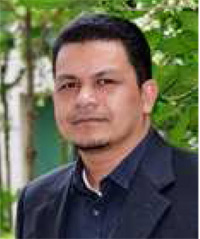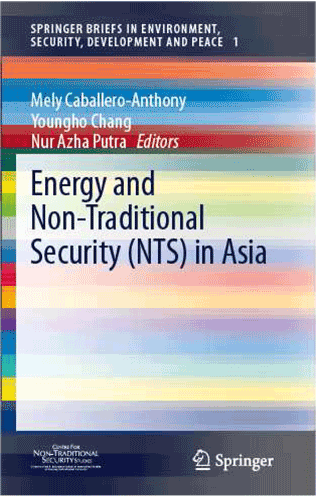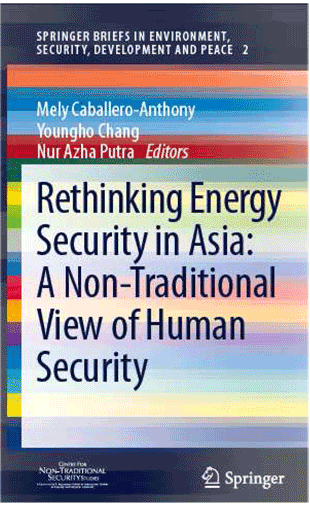|
|
| |
|
| |


SpringerBriefs in
Environment, Security, Development and Peace (ESDP)
A Peer-reviewed Book Series
Edited by
Hans Günter Brauch
Free University of Berlin and AFES-PRESS
| Vol 10 |
Azha Putra, Nur; Han, Eulalia (Eds.): Governments’ Responses to Climate Change: Selected Examples From Asia-Pacific. SpringerBriefs in Environment, Security, Development and Peace, Vol. 10. ASEAN Studies No. 1 (Cham – Heidelberg – New York – Dordrecht – London: Springer-Verlag, 2014).
ISBN (Print): 978-981-4451-11-6
ISBN (Online/eBook): 978-981-4451-12-3
DOI:
More on this book
Order Form
Order this book on the Springer Website
Order electronic version and individual chapters |

|
| |
|
|
This multidisciplinary volume articulates the current and potential public policy discourse between energy security and climate change in the Asia-Pacific region, and the efforts taken to address global warming. This volume is unique as it analyses two important issues -climate change and energy security - through the lens of geopolitics at the intersection of energy security. It elaborates on the current and potential steps taken by state and non-state actors, as well as the policy innovations and diplomatic efforts (bilateral and multilateral, including regional) that states are pursuing. This Brief stems from the assumption that its audience is aware of the consequences of climate change, and will therefore, only look at the issues identified. It provides a useful read and reference for a wide-range of scholars, policymakers, researchers and post-graduate students.
Content Level » Professional/practitioner
Keywords » Climate Change - Climate Policy - Energy Governance - Energy Security - Greenhouse Gas Emissions - International Relations - Low Carbon Green Growth - Sustainable City
Related subjects » Climate Change Management and Policy - Environmental Science & Engineering - Global Change - Climate Change - Policy, Economics, Management & Transport - Sustainable Development
Table of contents
Climate Change and Energy Security Post-Cancún: Indonesia Perspective.- Engaging Emerging Countries: Implications of China’s Major Shifts in Climate Policy.- India’s Efforts to Maintain and Enhance Energy Security While Reducing Greenhouse Gas Emissions.- Korea’s New Vision of Low Carbon Green Growth.- Singapore’s Policy Response to Climate Change: Towards A Sustainable City.- Policy Responses to Climate Change and Energy Security Post.- Cancun: Implications for the Asia.- Pacific Region’s Energy Security-Australian Perspective.
On the Editors
 |
Nur Azha Putra (Singapore): is a research associate with the Energy Security Division at the Energy Studies Institute (ESI), National University of Singapore (NUS), Singapore. He is also non-executive director, Board of Directors, at the Centre for Research on Islamic and Malay Affairs (RIMA), Singapore. Prior to ESI, Azha was associate research fellow at the Centre for Non-Traditional Security (NTS) Studies, S. Rajaratnam School of International Studies (RSIS), Nanyang Technological University (NTU), Singapore, and a journalist with the national newspaper, Berita Harian (BH), where he received the ‘Special Award for Excellence’. Azha graduated from NTU in 2008 with an MSc in International Political Economy. He holds a Bachelor of Information Technology from Central Queensland University, Australia (2002), and a Professional Diploma in Risk Planning from NUS-Asia Institute of Risk Management (2012).
His latest publications include: Caballero-Anthony, Mely; Chang, Youngho; Putra, Nur Azha (Eds): Energy and Non-Traditional Security (NTS) in Asia (Berlin/Heidelberg: Springer, 2012); and Caballero-Anthony, Mely; Chang, Youngho; Putra, Nur Azha (Eds): Rethinking Energy Security: A Non-Traditional View of Human Security (Berlin/Heidelberg: Springer, 2012).
Address: Energy Studies Institute (ESI), National University of Singapore (NUS), 29 Heng Mui Keng Terrace, Block A, #10-01, Singapore 119620.
Email: azha@nus.edu.sg.
Website: http://www.esi.nus.edu.sg/about-us/our-researchers/nur-azha-putra
|
| |
|
|
Eulalia Han (Singapore): is a research fellow with the Energy Security Division at the Energy Studies Institute (ESI), National University of Singapore (NUS), Singapore. Prior to ESI, Eulalia was a teaching assistant and tutor at various Australian universities. She was also policy officer at the Department of Emergency Services (DES), Queensland, Australia. Eulalia has a PhD in International Relations (2011) from Griffith University and a Bachelor of Arts in Political Science (2007), which she graduated with Class I Honours, from the University of Queensland. She is a recipient of the ‘Australian Post-Graduate Award’ scholarship (2009-2011). Her latest publications include: (with Rane, Halim): Making Australian Foreign Policy on Israel-Palestine: Media Coverage, Public Opinion and Interest Groups (Carlton: Melbourne University Publishing Limited, 2013).
Address: Energy Studies Institute (ESI), National University of Singapore (NUS), 29 Heng Mui Keng Terrace, Block A, #10-01, Singapore 119620.
Email: esihne@nus.edu.sg.
Website: http://www.esi.nus.edu.sg/about-us/our-researchers/dr-eulalia-han
|

|
| |
|
|
National University of Singapore
A leading global university centred in Asia, the National University of Singapore (NUS) is Singapore's flagship university which offers a global approach to education and research with a focus on Asian perspectives and expertise.
Its 16 faculties and schools across three campus locations in Singapore – Kent Ridge, Bukit Timah and Outram – provides a broad-based curriculum underscored by multi-disciplinary courses and cross-faculty enrichment. NUS’ transformative education includes programmes such as student exchange, entrepreneurial internships at NUS Overseas Colleges, and double degree and joint degree programmes with some of the world’s top universities, offering students opportunities and challenges to realise their potential. The learning experience is complemented by a vibrant residential life with avenues for artistic, cultural and sporting pursuits. Over 37,000 students from 100 countries further enrich the community with their diverse social and cultural perspectives.
NU has three Research Centres of Excellence (RCE) and 23 university-level research institutes and centres. It is also a partner for Singapore’s 5th RCE. The University shares a close affiliation with 16 national-level research institutes and centres. Research activities are strategic and robust, and NUS is well-known for its research strengths in engineering, life sciences and biomedicine, social sciences and natural sciences. Major research thrusts have been made recently in several fields such as quantum technology; cancer and translational medicine; interactive and digital media; and the environment and water. The University also strives to create a supportive and innovative environment to promote creative enterprise within its community.
NUS is actively involved in international academic and research networks such as the Association of Pacific Rim Universities (APRU) and International Alliance of Research Universities (IARU).

Energy Studies Institute
Since its establishment in November 2007, the Energy Studies Institute (ESI) is well on its way towards becoming a presence in the international energy policy research arena. For instance, in the 2012 Global Go To Think Tanks Index Report by the University of Pennsylvania Think Tank and Civil Societies Program, ESI was listed as among the Top 20 Energy and Resource Policy Think Tanks.
ESI provides timely and quality analyses in an evolving energy research landscape influenced by regional and global events. As a leading energy and resource policy think tank, ESI is committed to leveraging the best resources, methods and tools to carry out policy-related energy research and to raise public awareness. ESI’S research have been published in key internationally refereed journals and other publications which includes the ESI Bulletin that is widely read. The researchers at ESI often write newspaper commentaries and appear on television interviews.
As of 2013, ESI has five research tracks, Climate Change, Energy Efficiency, Natural Gas, Nuclear Energy, and Power Generation, and two regional networks, Asia-Europe Energy Policy Research Network and the East Asia Programme.
ESI activities
As a thought leader, ESI frequently organises activities that include international conferences and seminars in the areas of energy economics, energy and the environment, and energy security. Its events are organised jointly with other think tanks, government agencies and industries. ESI’s activities include the following:
-
Perform academic research and undertake energy studies commissioned by public, private agencies and industry
-
Conduct public outreach programmes
-
Participate in the Singapore International Energy Week and local and overseas energy-related events
-
Conduct research seminars, organise international conferences, workshops, and capacity-building programmes
Collaborators and Research Sponsors
Since 2007, ESI has worked with various state and non-state actors such as the following:
-
(Singapore government and its agencies) Ministry of Trade and Industry, Ministry of the Environment and Water Resources, Ministry of Foreign Affairs, National Climate Change Secretariat, National Environment Agency, Building and Construction Authority, Energy Markey Authority, and the Land Transport Authority.
-
United Nations Economic and Social Commission for Asia and the Pacific, Asia-Pacific Economic Cooperation, Economic Research Institute for ASEAN and East Asia, and the Centre for Non-Traditional Security Studies, S. Rajaratnam School of International Studies, Nanyang Technological University
Previous books by one of the editors in this book series
 |
Vol 1 |
Mely Caballero-Anthony, Youngho Chang and Nur Azha Putra (Eds.) [Singapore]: Energy and Non-Traditional Security (NTS) in Asia. SpringerBriefs in Environment, Security, Development and Peace [ESDP] vol. 1 (Heidelberg – Dordrecht – London – New York: Springer-Verlag, 2013).
ISBN (Print): 978-3-642-29705-2
ISBN (Online/eBook): 978-3-642-29706-9
DOI: 10.1007/978-3-642-29706-9
More on this book
Order Form
Order this book on the Springer Website
Order electronic version and individual chapters |
| |
|
|
| Vol 2 |
Mely Caballero-Anthony, Youngho Chang and Nur Azha Putra (Eds.) [Singapore]: Rethinking Energy Security in Asia: A Non-Traditional View of Human Security. SpringerBriefs in Environment, Security, Development and Peace [ESDP] vol. 2 (Heidelberg – Dordrecht – London – New York: Springer-Verlag, 2012).
ISBN (Print): 978-3-642-29702-1
ISBN (Online/eBook): 978-3-642-29703-8
DOI: 10.1007/978-3-642-29704-5
More on this book
Order Form
Order this book on the Springer Website
Order electronic version and individual chapters |

|
| |
|
|
|
|
|